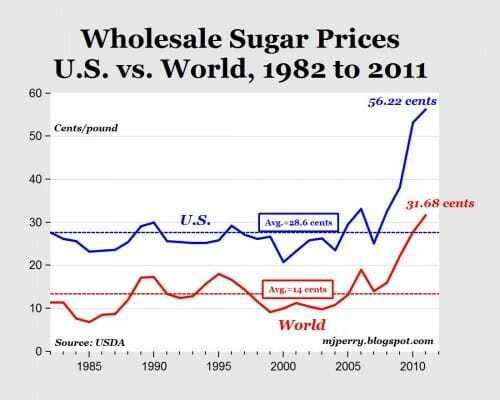We Still Haven't Figured Out How to Measure Prosperity
The previous chart on beer availability reminds me of an issue I have been thinking about for a while -- that we do no know how to measure prosperity.
GDP growth and unemployment reduction are terrible measures. Just to give one example, these measures looked fabulous in WWII. But the average person living in the US had access to almost nothing -- they couldn't buy anything under rationing, they couldn't travel for leisure, etc. GDP looked great because we were building stuff and then blowing it up, the economic equivilent of digging a hole and filling it in (but worse, because people were dying). And unemployment looked great because we had drafted everyone and sent them off to get shot.
But median income and net worth numbers fail to measure prosperity as well. The reason was described in this post here way back in 2007.
The home on the left was owned by Mark Hopkins, railroad millionaire and one of the most powerful men of his age in California. Hopkins had a mansion with zillions of rooms and servants to cook and clean for him, but he never saw a movie, never listened to music except when it was live, never crossed the country in less than a week. And while he could afford numerous servants around the house, Hopkins (like his business associates) tended to work 6 and 7 day weeks of 70 hours or more, in part due to the total lack of business productivity tools (telephone, computer, air travel, etc.) we take for granted. Hopkins likely never read after dark by any light other than a flame.
If Mark Hopkins or any of his family contracted cancer, TB, polio, heart disease, or even appendicitis, they would probably die. All the rage today is to moan about people's access to health care, but Hopkins had less access to health care than the poorest resident of East St. Louis. Hopkins died at 64, an old man in an era where the average life span was in the early forties. He saw at least one of his children die young, as most others of his age did. In fact, Stanford University owes its founding to the early death (at 15) of the son of Leland Stanford, Hopkin's business partner and neighbor. The richest men of his age had more than a ten times greater chance of seeing at least one of their kids die young than the poorest person in the US does today.
How do we take into account that even if a person has the same income as someone in 1952, they are effectively wealthier in many ways due to access to medical procedures, travel, entertainment, electronic devices, etc?
Somehow we need to measure consumer capability -- not just how much raw money one has but what can one do with the money? What is the horizon of possibilities? Deirdre McCloskey tends to eschew the term capitalism in favor of "market-tested innovation." I think that is a pretty powerful description of our system. But if it is, we really are only measuring the impact of productivity and cost-reduction innovations. How do we measure the wealth impact of consumer-empowerment innovations like iPhones? Essentially, we don't. Which, by the way, may be one reason our current crappy metrics say we have growing income inequality. With our current metrics, Steve Jobs' increase in wealth is noted in the metrics, but the metrics don't show the rest of us getting any wealthier by the fact that we can now have iPhones (or the myriad of competitors the iPhone spawned). The consumer surplus from iPhones undoubtedly dwarfs the money Jobs made, but it doesn't show up in any wealth calculations.
A few years ago I told a youth group that there were still many things left to discover in the mundane world -- by this I meant the everyday world we encounter and not just at the limits of the universe or at the scale of quarks. The example I gave at the time is that there is a lot of room for better techniques to tease out causality in complex systems -- e.g. how much did the stimulus really affect the economy or how much does CO2 really affect temperatures. I would add this question of measuring prosperity as a second item in this category.


